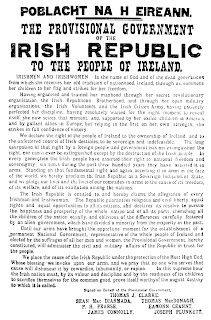Easter 1916
by W. B. Yeats
I have met them at close of day
Coming with vivid faces
From counter or desk among grey
Eighteenth-century houses.
I have passed with a nod of the head
Or polite meaningless words,
Or have lingered awhile and said
Polite meaningless words,
And thought before I had done
Of a mocking tale or a gibe
To please a companion
Around the fire at the club,
Being certain that they and I
But lived where motley is worn:
All changed, changed utterly:
A terribly beauty is born.
That woman's days were spent
In ignorant good-will,
Her nights is argument
Until her voice grew shrill.
What voice more sweet than hers
When, young and beautiful,
She rode to harriers?
This man had kept a school
And rode our wingèd horse;
This other his helper and friend
Was coming into his force;
He might have won fame in the end,
So sensitive his nature seemed,
So daring and sweet his thought.
This other man I had dreamed
A drunken, vainglorious lout.
He had done most bitter wrong
To some who are near my heart,
Yet I number him in the song;
He, too, has resigned his part
In the casual comedy;
He, too, has been changed in his turn,
Transformed utterly:
A terrible beauty is born.
Hearts with one purpose alone
Through summer and winter seem
Enchanted to a stone
To trouble the living stream.
The horse that comes from the road,
The rider, the birds that range
From cloud to tumbling cloud,
Minute by minute they change;
A shadow of cloud on the stream
Changes minute by minute;
A horse-hoof slides on the brim,
And a horse plashes within it;
The long-legged moor-hens dive,
And hens to moor-cocks call;
Minute to minute they live;
The stone's in the midst of all.
Too long a sacrifice
Can make a stone of the heart.
O when may it suffice?
That is Heaven's part, our part
To murmur name upon name,
As a mother names her child
When sleep at last has come
On limbs that had run wild.
What is it but nightfall?
No, no, not night but death;
Was it needless death after all?
For England may keep faith
For all that is done and said.
We know their dream; enough
To know they dreamed and are dead;
And what if excess of love
Bewildered them till they died?
I write it out in a verse --
MacDonagh and MacBride
And Connolly and Pearse
Now and in time to be,
Wherever green is worn,
Are changed, changed utterly:
A terrible beauty is born.
The 1916 Easter Rising
The Easter Rebellion, was an armed uprising of Irish nationalists against the rule of Great Britain in Ireland. The uprising occurred on Easter Monday, April 24, 1916, and centred mainly in Dublin. The chief objectives were the attainment of political freedom and the establishment of an Irish republic. Centuries of discontent, marked by numerous rebellions, preceded the uprising. The new crisis began to develop in September 1914, following the outbreak of World War I, when the British government suspended the recently enacted Home Rule Bill, which guaranteed a measure of political autonomy to Ireland. Suspension of the bill stimulated the growth of the Citizen Army, an illegal force of Dublin citizens organised by the labour leader Jim Larkin (died 1948) and the socialist James Connolly (1870-1916); of the Irish Volunteers, a national defence body; and of the extremist Sinn Fein. The uprising was planned by leaders of these organisations, among whom were the British consular agent Sir Roger David Casement, the educator Padhraic Pearse (1879-1916), and the poet Thomas MacDonagh (1878-1916).
Hostilities began about noon on April 24, when about 2000 men led by Pearse seized control of the Dublin post office and other strategic points within the city. Shortly after these initial successes, the leaders of the rebellion proclaimed the Independence of Ireland and announced the establishment of a provisional government of the Irish Republic. Additional positions were occupied by the rebels during the night, and by the morning of April 25 they controlled a considerable part of Dublin. The counteroffensive by British forces began on Tuesday with the arrival of reinforcements. Martial law was proclaimed throughout Ireland. Bitter street fighting developed in Dublin, during which the strengthened British forces steadily dislodged the Irish from their positions. By the morning of April 29, the post office building, site of the rebel headquarters, was under violent attack. Recognising the futility of further resistance, Pearse surrendered unconditionally in the afternoon of April 29.
The British immediately brought the leaders of the uprising to trial before a field court-martial. Fifteen of the group, including Pearse, Connolly, and MacDonagh, were sentenced to death and executed by firing squad. Four others, including the American-born Eamon de Valera, received death sentences that were later commuted to life imprisonment, although de Valera and some others were granted amnesty the next year. Casement was convicted of treason and hanged. Many others prominently connected with the rebellion were sentenced to long prison terms. The uprising was the first of a series of events that culminated in the establishment of the Irish Free State (predecessor of the Republic of Ireland) in 1921. Casualties were about 440 British troops and an estimated 75 Irish (below are their names). Property damage included the destruction of about 200 buildings in Dublin.
Subscribe to:
Post Comments (Atom)



No comments:
Post a Comment